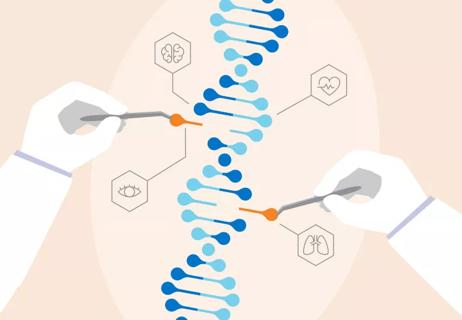Why both nature and nurture matter

When it comes to your health, who you are and where you come from matter. So when you gather your family health history, include your ancestry and ethnicity.
Advertisement
Cleveland Clinic is a non-profit academic medical center. Advertising on our site helps support our mission. We do not endorse non-Cleveland Clinic products or services. Policy
Both offer clues about your health risks. Integrative medicine specialist Yufang Lin, MD, explains why where you come from plays an important role in your health.
When you visit your doctor, you’re often asked to complete a health history, including health information about family members. Dr. Lin says taking a complete look is vital to helping your healthcare team get a full picture of your health.
“If your doctor asks you about any health conditions that run in your family, it’s important to consider your ancestry and ethnicity, too,” she says. “Understanding each of these can improve your care.”
Ancestry and ethnicity might seem like the same thing. In reality, they’re quite different. It’s a bit like the old nature-versus-nurture debate, although both are important:
Ancestry refers to where your family is from, and it can offer clues about your genetics. Ancestry can be more specific than the typical “race” categories you see on forms and surveys. For example, someone who is Asian could descend from one or many ancestral groups.
Ethnicity refers to your cultures, customs and, often, lifestyle choices.
“It may be difficult to identify both your ancestry and ethnicity correctly because they are not always obvious,” Dr. Lin says.
Advertisement
We’ve developed tools to help you collect family history.
Some diseases occur more often among certain groups of people than in the general population. That’s why the “nature” of your ancestry matters.
For example:
But don’t let this alarm you. A group’s genetic predisposition toward a disease does not mean all group members will develop it. But if you’re part of that group, your risk is higher. Your doctor may want you to go through genetic counseling and screening. You also may want to have certain tests earlier or more frequently.
Dr. Lin says your ancestry also may affect how you respond to medications — a concept called pharmacogenetics.
For example, the anticonvulsant drug carbamazepine sometimes causes severe and even fatal drug reactions in people of Asian descent. Of course, these drug reactions may still occur in people who are not Asian, and they may not occur in all people of Asian descent. But knowing makes a difference in how your doctor approaches prescriptions.
This is the “nurture” side of the discussion. Ethnicity is all about your lifestyle, culture and behavior. And just like your genetics, all of these affect your health risks.
Do people in your culture eat a low-fat diet that is high in fruits and vegetables? Do they take walks as a family after dinner? Those are positive customs.
On the flip side, some ethnicities have higher rates of smoking and more damaging diets.
Here’s why it matters: If you’re part of a group with a higher genetic risk, you often can reduce that risk by making better lifestyle choices. But you can only do that if you have an open, honest discussion about both ancestry and ethnicity with your care team.
Ancestry and ethnicity alone don’t determine if you will develop a disease. But you and your doctors can use both as a part of a personalized toolkit to assess your risk — and to do something about it.
Advertisement
Learn more about our editorial process.
Advertisement

The OR6A2 gene could be behind your dislike of this herb — but with time, your brain may be convinced to like it

This evolving technology may one day eliminate conditions like sickle cell anemia and hemophilia

Genetic markers can determine if you’ll develop Huntington’s disease or pass it on to your children

The short answer from a genetic counselor

Testing can both reveal the likelihood that you’ll pass on complement 3 glomerulopathy and identify possible treatments

Altered genes may cause your heart muscle to thicken

Wearing a scarf, adjusting your outdoor activities and following your asthma treatment plan can help limit breathing problems

Your diet in the weeks, days and hours ahead of your race can power you to the finish line

When someone guilt trips you, they’re using emotionally manipulative behavior to try to get you to act a certain way